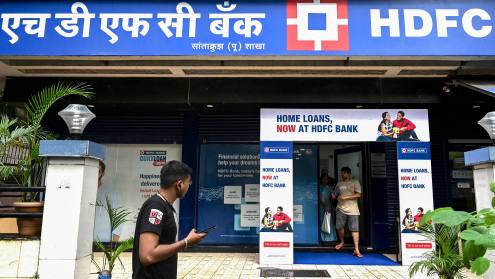Brian Caplen, editor of The Banker, said: “At one time several UK banks were among a handful of truly global players. But since the financial crisis they have reduced their scope and are focusing on a fewer areas in a bid to restore profitability. We may have seen the end of the UK-based global bank.”
By contrast, UK banks which focus only on the domestic market are holding steady – Lloyds stayed in 22nd position and Nationwide rose from 119th to 105th.
Chinese banks continue to improve their position. ICBC topped the ranking for the third year in a row. China now has three banks in the top five, with Bank of China moving from seventh place to fourth and China Construction Bank staying in second place. Agricultural Bank of China moved up from ninth place to sixth.
Chinese banks also make the most profits. The top four Chinese banks have the highest profits in the world, and collectively Chinese banks make 1.75 times the amount US banks make and almost 10 times UK profits. In 2008, UK banks made more than Chinese banks.
The restructuring of UK banks has also had a negative impact on employment. HSBC, which recently announced a further 50,000 job losses, has reduced its global workforce by nearly 8% since 2011. Most major UK banks have cut staff since the financial crisis while the major Chinese banks have been hiring. ICBC alone now has more employees that the entire UK banking sector.
Profits and returns at UK banks are slowly recovering, although they are well below their pre-crisis levels. Total pre-tax profits increased by 49% to $32.5bn but are still only one-third of their peak performance in 2007. Return on capital is 7.31%, which is half the levels in the Middle East and North America and one-third of the levels in Africa and Latin America.
UK banks are doing better than eurozone banks, where the return on capital is a meagre 4.61% despite a 123% increase in profits. The countries with the worst overall banking losses were all in the eurozone – Greece, Italy, Portugal, Austria and Cyprus – as were the top 10 banks with largest losses. Italy’s Banca Monte dei Paschi di Siena recorded the largest losses worldwide at €7.7bn.
“With the UK holding an EU membership referendum, the concern must be that while the EU desperately needs reform, it will be too preoccupied with its own issues to properly consider arguments made by the UK government,” says Mr Caplen.
– ends –
Press release downloads:


Regions ranked by return on capital
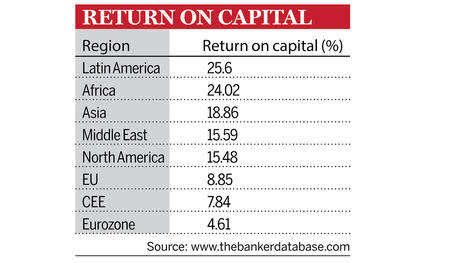
Top 10 world banks
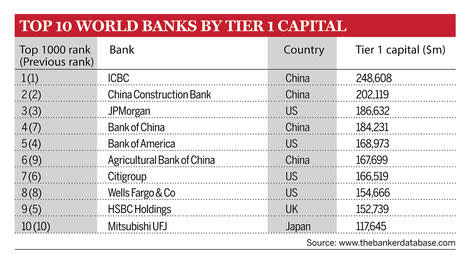
Top 5 world banks 2008
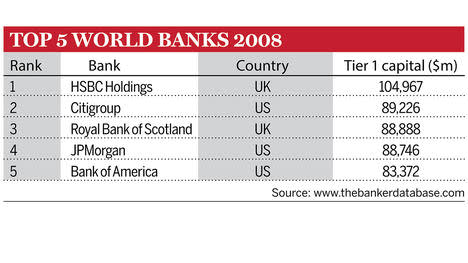
Changes in employment since 2012
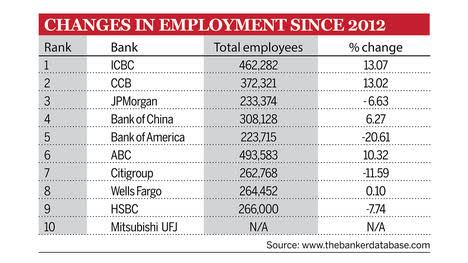
For further information please contact:
FT:
Jenny Cusack
T: 020 7873 4920
E: jenny.cusack@ft.com
Launch PR:
Laura Cullinane
T: +44 (0)20 7758 3929
M: 07456858777
Email: laurac@launchpr.co.uk
About The Banker:
The Banker is the world's premier banking and finance resource, providing global financial intelligence since 1926.
The Banker is the key source of data and analysis for the industry. The Banker’s Top 1000 World Banks ranking has been setting the industry benchmark since 1970, providing comprehensive intelligence about the health and wealth of the banking sector. To find out more visit www.thebanker.com/top1000worldbanks.
Brian Caplen has been a financial and business journalist for more than 25 years. He has worked in Hong Kong and the Middle East and reported from all over the world. He joined The Banker in 2000 and became editor in 2003.
About The Banker Database:
The Banker Database provides comprehensive financial data, news feeds and executive contact data on the leading banks in every country. Our data has been standardised for regional reporting and regulatory variations, and forms the basis of The Banker's monthly bank rankings.
Over the past five decades our rankings have become the industry standard for measuring bank performance and strength. The database tracks banks in more than 190 jurisdictions representing 90% of the world’s total banking assets. To find out more about The Banker Database visit www.thebankerdatabase.com.
About the Financial Times:
The Financial Times, one of the world’s leading business news organisations, is recognised internationally for its authority, integrity and accuracy. Providing essential news, comment, data and analysis for the global business community, the FT has a combined paid print and digital circulation of 720,000. Mobile is an increasingly important channel for the FT, driving almost half of total traffic. FT education products now serve two-thirds of the world’s top 50 business schools.




